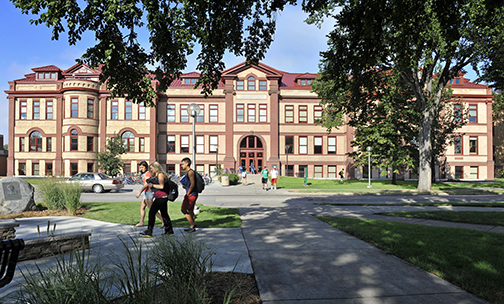Tribal and Indigenous Peoples Studies
North Dakota is the home of the Oceti Sakowin (Dakota, Lakota, and Nakota), Nueta, Sahnish, Hidatsa, and Anishinaabe peoples, in addition to many other diverse Indigenous peoples connected to these lands. There are five federally recognized Tribal Nations including Mandan, Hidatsa, & Arikara Nation (Three Affiliated Tribes), the Spirit Lake (Dakota) Nation, the Standing Rock (Lakota and Dakota) Sioux Tribe, the Turtle Mountain Band of Chippewa (Anishinaabe), and the Sisseton-Wahpeton Oyate (Dakota). Indigenous peoples have lived in North Dakota for over 10,000 years and remain a vibrant force in communities all over the region.
Tribal and Indigenous Peoples Studies builds strong communities through mutual understandings of our shared and complex history, shaped by settler colonialism and white supremacy, that continue to influence our relationships today. The minor is open to all NDSU students who wish to enhance their understanding of the history, culture, and contemporary issues of North American Indigenous populations and Indigenous populations on other continents.
THE PROGRAM
The requirements of the minor are flexible to allow students to create a program most beneficial to them. There is one required introductory course. To complete the other credits required for the 18 credit hour minor, students may choose from offerings in a variety of topics including Education, History, Literature, Anthropology, and Latin American Studies, among others. Students are welcome to transfer credit for courses from Tribal Colleges and other universities for Indigenous languages, or Native American or Indigenous studies courses.
WHAT WILL I LEARN
Students in the minor will be able to:
• describe the diversity of Indigenous history in a global context.
• reflect on Indigenous perspectives and cultural understandings.
• identify ongoing Indigenous issues at the regional, national, and international level, including the concept of and struggles over sovereignty and land rights.
• critically evaluate sources of knowledge about Indigenous peoples and histories.
HOW IT WILL IMPACT MY CAREER
A minor in Tribal and Indigenous Peoples studies will benefit any career choice. Students minoring in TIPS will be better equipped for careers in K-12 education, legal professions, social work, nursing and the health professions, environmental work, and any career that serves a culturally diverse population. TIPS minors will also apply their knowledge to benefiting the communities in which they live.
Minor Requirements:
Introductory Course (3 Credits):
Tips 101 Introduction to Native American and Indigenous Studies
Electives (15 Credits):
ANTH 445 Archaeology of Native North America
ANTH 446 Latin America & Carribean: Afro-Latino/as, Gender, Indigeneity
ANTH 491 SEMINAR: Community-Based and Indigenous Archaeologies
ANTH 491 SEMINAR: Indigenous Peoples and Cultures of the Upper-Midwest
EDUC 489 Teaching Students of Diverse Backgrounds
ENGL 474 Native American Literature
HIST 431 The North American Plains
HIST 436 American Frontier to 1850
HIST 473 Colonial Mexico
HIST 475 Aztec, Maya, and Inca
SPAN 331 Introduction to Spanish American Civilization and Culture
For further information:
Contact the Department of Sociology and Anthropology

